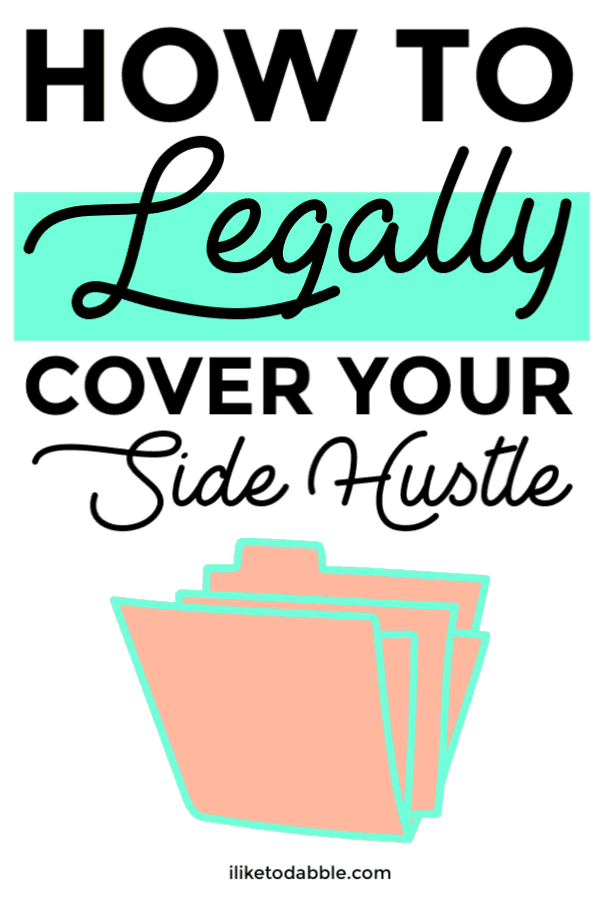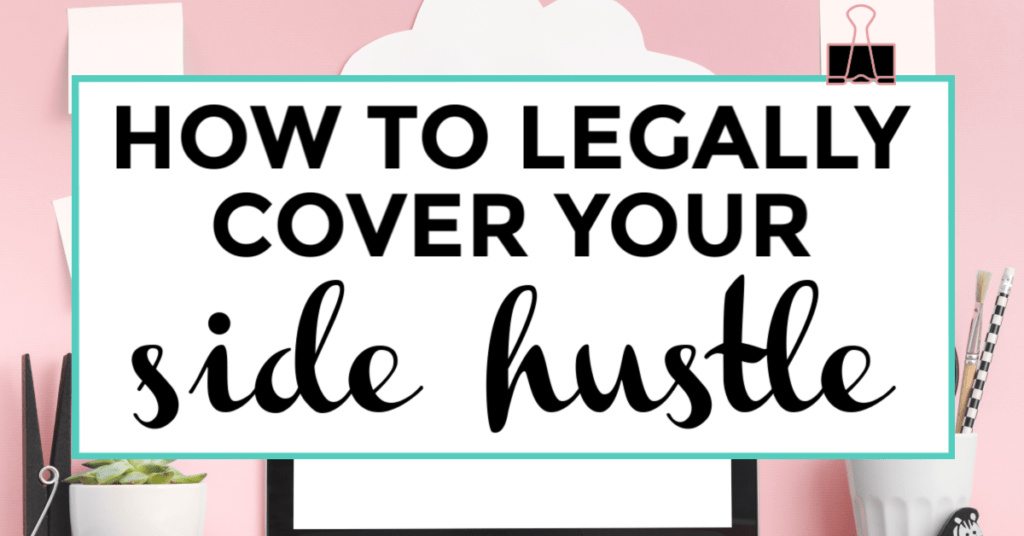Our website is supported by our users and contains affiliate links. We get paid when you purchase or sign up for anything through those links. Read the full disclaimer for more information.
Last Updated on April 11, 2022 by Daniella
As we go into 2020 one of the new series I am launching is centered around my readers, as in all of you! Welcome to the Reader’s Questions Series where I will feature a question from one of my readers along with an answer and some advice.
If you have a reader question you’d like to submit to this series, contact me here!
Keep in mind that this series (and blog) is just for fun and should never be used in replacement for professional financial advice. I use my own life experience and circumstance to answer these questions.
I 100% recommend you reach out to a tax professional, accountant and/or lawyer when figuring out the specifics of your business structure and how to report your income and losses from your side business.
For our first post in the series, I am featuring a question that I actually get quite often and that is how to legally cover your side hustle:
My question is about the legal/business aspect of side hustles (not the most fun topic unfortunately). What is the difference between LLC, EIN, etc? What legal aspects do you need to cover yourself when your side hustle really starts sky- rocketing? The reason I am asking these questions is because my tiny little side hobby is growing more and more into a business each day. It’s a good problem to have! I’m just not sure where to go from here. I would love any guidance you can offer me and your readers!
Thanks!-Tara
This is the first year that I’ve really legitimized my side hustle and registered my LLC, EIN and got a business bank account outside of my PayPal. Say hi to my new baby, Iliketodabble LLC!
Let’s get into the nitty-gritty of how I did this and this question.
Table of Contents
What is the difference between an LLC and an EIN?
LLC stands for Limited Liability Company and an EIN stands for Employer Identification Number. They are two different things but definitely go hand in hand.
LLC
I formed a single-member LLC which is not the only type of LLC that you can register.
As a single-member LLC, you can choose to be taxed as a sole-proprietor or as a corporation. If you choose to be treated as a corporation, you must file a Form 8832.
If an LLC decides to not be treated as a corporation, it is a “disregarded entity” and the activities for the LLC must be reflected on a Form 1040 Schedule C come tax time (which is the same form you fill out as a sole proprietor). Turbo Tax makes filing taxes for my LLC seamless along with my full-time day job taxes but if all of this confuses you, I suggest looking into hiring an accountant.
There are several different types of LLC’s including:
- Single-member LLC
- General partnership
- Family limited partnerships
- Series LLC
- Restricted LLC
- L3C company
- Anonymous LLC
- Member-managed LLC
- Manager-managed LLC
You’ll want to decide on a business structure first before considering the pros and cons of an LLC, partnership or corporation and which one is best for you and your business. If an LLC is a route you want to go for how quick and affordable it is, I suggest this article to step you through all you need to know as it is what I used when registering my LLC.
If you do decide registering as an LLC, I also recommend this LLC operating agreement template.
Related: How to Calculate Your Freelance Rate (Taxes Included)
EIN
An employer identification number is what I needed to open a business bank account. There are some that don’t require an EIN but most do.
Along with an EIN, I was also required to provide my Operating Agreement of my LLC to open a business bank account with our local credit union.
You can register your LLC through your state-specific site (you can view a list of state websites here and scroll down to the state list) and EIN pretty quickly and cheaply right through the IRS website, or you can have a company like IncFile help you out for a little more money.
What legal aspects do you need to cover yourself when your side hustle really starts skyrocketing?
The reason I formed a single-member LLC was to create that legal entity separate from myself. The point of forming a single-member LLC is to provide legal separation versus a normal sole proprietorship which is what I was before registering my LLC on January 1st, 2020.
I actually filed the registration for my LLC in October but with the start date of January 1st, 2020 so I wouldn’t have to compete with the IRS database come the 1st.
Along with an EIN and LLC Operating Agreement, you will want to check if your state requires you to have any specific licenses that pertain to your specific business structure and/or industry.
The reasons why I chose an LLC were:
- Limited liability (it’s in the name *winky face*)
- Easy to startup and upkeep
- Flexibility
But you may have completely separate needs for your side hustle.
There are other ways to legally protect yourself and that is by looking into other forms of business structures such as:
- Partnerships
- Corporations
- C Corp
- S Corp
- B Corp
- Non-Profit
If you have a friend or a family member who is a lawyer, I’d also suggest speaking with them to get the specifics of what would work best for you. RocketLawyer is another great online resource that can help answer your legal questions.
Keeping Track of Income, Expenses, and Taxes
If you’ve been operating your side hustle as a sole proprietorship and not keeping track of what is your side hustle income, day job income, side hustle expenses, and personal expenses – stop right there!
I’ve made this mistake in the past and thought I could keep everything side hustle related in my PayPal and everything would be great. Then I had some companies and people pay me that didn’t pay via PayPal and I had to start getting a little more organized.
Until I registered my LLC and got a business bank account, I went forward with trying to keep everything in my PayPal with using QuickBooks to categorize the transactions and pull in any others that fell outside of my PayPal. QuickBooks has a self-employed version that makes this very easy.
After I got my business bank account, I linked that into QuickBooks also and changed all of the payment settings to point to this new account in all the of the partners I receive payment from.
Related: Blog Income Report: My 2019 Blog Review & Analysis
Self-Employment Tax
If your side hustle is ramping up, you might need to start paying quarterly self-employment taxes to the IRS if you haven’t already. This is another reason why I love QuickBooks is I can pay these through the tool.
If you earn more than $400 from any independent contract work in a year, you are required to pay the self-employment tax of 15.3%. Included in that are Social Security and Medicare taxes.
Independent contract work refers to any work that you weren’t a direct employee for the company paying you. This also means the payer did not withhold taxes for you prior to paying you.
As an independent contractor, you have to keep track of how much you owe and pay your own taxes. This would include things like freelance writing, being a brand ambassador, and jobs in the gig economy such as driving for DoorDash.
As a sole proprietor and single-member LLC, you are also required to pay this same self-employment tax in addition to your normal income tax.
Tax Minimization
Starting out with my side hustle, I was so worried about keeping expenses low so I could make the most I could from my side business efforts. Then I realized, with more money comes more taxes and taxes suck. So while I am still growing, I’ve decided to invest more back into the business.
Remember though that if you want to save money, buying more things for your business might keep your taxes lower but you are still spending money on those products. It all depends on what your goals are. You might want to look into consulting a CPA (certified public accountant) for how you can minimize taxes.
I also love finding as many tax deductions as possible. There are things I never knew I could deduct like my home internet which I found out is safe to claim 100% of your home internet since it is required for your business. This post has some great tips for deductions.
Are you covered?
This is just a little taste of all the legal ways you could cover yourself and your side hustle, especially when it starts ramping up.
In addition to an LLC Operating Agreement, you might need other legal templates, contracts for freelancing or other work, or pages for your website to help cover you and your side hustle (and avoid getting sued).
However, it is perfectly fine to start as a sole proprietor and you don’t absolutely NEED an LLC to get started.
I recommend you checking out these legal template bundles that were created by an actual business lawyer (which I also use and love):
- Legal pages for your website
- Legal template bundle (you can get all you would ever need or choose as you grow)
- Independent contractor (freelance contract) template
- Coaching agreement template (for any coaching program you want to create)
- Partnership agreement template
- Contract template for working with brands (sponsorship agreement contract template)
I hope this was helpful but I am not an accountant nor a legal professional. So, I definitely suggest reaching out to a lawyer and accountant to get their opinions.
If you have any questions regarding my specific experience with my own business, feel free to reach out to me and I’d be happy to chat.
Where are you currently with your side hustle? Have you formed an LLC yet or still have questions? Drop me a line below with your comment!
Related posts:
- Blogging as a Side Hustle: Mid Year Blog Checkin, Income, Redesign & More
- Side Hustle Income Report: How We Made $3,901.19 Extra in March 2019
- The Insurance You Really Need If You Have A Side Hustle
- MLM Scams and Horror Stories: The Screwed Up World of Multi-Level Marketing
- How to Get Your Financial Life Together
- 31 Best Work From Home Jobs Hiring Today
Subscribe to get your free list of side hustles you can start this week!
Claim your free list of side hustles + tons of helpful resources to get started!
Pin it for later!


Daniella is the creator and author of iliketodabble.com. When their wife Alexandra and them aren’t globetrotting or playing with their 7+ animals, they are dabbling and working towards a future of financial freedom.


Pingback: Should you tell coworkers your salary? The answer isn’t so simple
Pingback: Common Blogging Problems You Can & Should Avoid - My Life, I Guess
Pingback: How to Include Your Side Hustle on Your Resume: The Ultimate Guide - My Life, I Guess